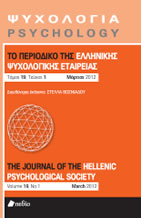Feminism and psychology: Implications for research, clinical practice and collective social action

Abstract
The papers of this special issue fall into the general area of the feminist critical psychology, since they reveal the special and often marginalized experience of different groups of women, place and interpret the issues discussed within the context of the existing social-cultural ideology regarding to gender and/or ethnic identity and connect the scientific research with practice, the empowerment of the participants and the social-political action. This commentary underlies three important issues that have been brought into the front by this feminist critique on psychology and which are also discussed among all the papers. These are (a) the adaptation of qualitative methodology in psychological research, (b) the recognition of the interaction between the identity of gender and other identities, as well as (c) the notions of social justice and social action
Article Details
- How to Cite
-
Αθανασιάδου Χ. (2020). Feminism and psychology: Implications for research, clinical practice and collective social action. Psychology: The Journal of the Hellenic Psychological Society, 19(2), 230–236. https://doi.org/10.12681/psy_hps.23619
- Issue
- Vol. 19 No. 2 (2012)
- Section
- SPECIAL SECTION

This work is licensed under a Creative Commons Attribution-ShareAlike 4.0 International License.
The journal PSYCHOLOGY adopts a Platinum open-access policy. Submission, processing or publication costs are waived by the Hellenic Psychological Society. Papers published in the journal PSYCHOLOGY are licensed under a 'Creative Commons Attribution-ShareAlike 4.0 International' licence. The authors reserve the copyright of their work and grant the journal the right of its first publication. Third-party licensees are allowed to use the published paper immediately after publication as they wish, provided they retain the defined by the license copyright formalities, regarding the reference to its author(s) and its initial publication in the journal PSYCHOLOGY. Moreover, any adjusted work should be shared under the same reuse rights, so with the same CC license.





